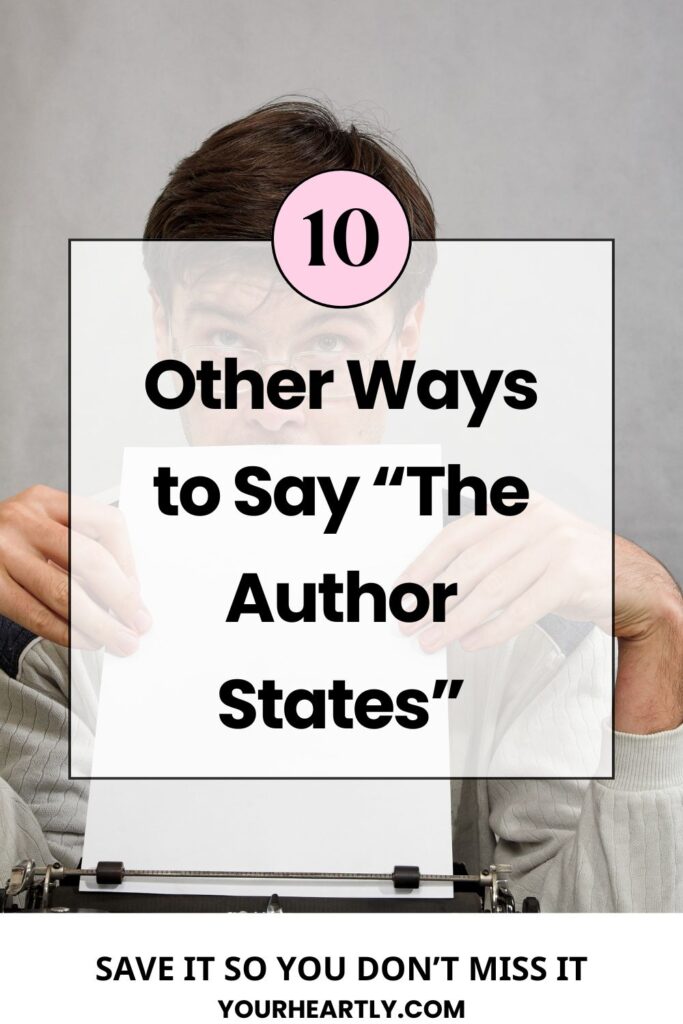When you’re writing an essay, a research paper, or even a book review, it’s easy to fall into the trap of using the same phrases over and over. One of the most common culprits? “The author states.” It’s short, clear, and safe—but let’s be honest, it’s also repetitive. If you want your writing to sound polished, professional, and engaging, you need to vary your phrasing. That’s where this guide comes in.
Think about it. If you were reading a paper where every other sentence began with “The author states…,” you’d probably get bored quickly. Readers notice repetition, and it can make your work feel flat—even if your ideas are brilliant. Using a variety of expressions not only improves flow, it also helps you communicate subtle differences in meaning. For example, “The author argues” suggests persuasion, while “The author observes” points to a neutral statement.
Another benefit? Varied phrasing shows strong command of language. It signals to your professor, editor, or reader that you understand nuance and can adapt your writing to the tone and context. In academic writing, small changes like this can have a big impact on how your work is received.

In this article, you’ll discover 10 fresh, precise, and versatile alternatives to “The author states.” Each option includes examples, when to use it, and why it works. By the end, you’ll have a ready-made toolkit of phrases you can use to make your writing more dynamic, accurate, and reader-friendly.

Let’s dive in.
1. The Author Argues
When you use “The author argues,” you’re signaling that the writer is making a case or taking a stance. This phrase works best when the text is persuasive in nature or presents a position backed by evidence.
For instance:
The author argues that climate change policies must prioritize renewable energy to be effective.
This choice of words highlights that the author is not just stating facts, but actively trying to convince the reader. It’s perfect for analytical essays, opinion pieces, and argumentative papers.
You’ll also find this phrase useful when summarizing a work that responds to opposing views. It subtly cues the reader that there’s a discussion or debate involved. Unlike “states,” which is neutral, “argues” carries a sense of intention and reasoning.
In your own writing, use “The author argues” when you want to frame the source material as a contribution to a conversation, not just a presentation of data. It’s a strong, active phrase that adds intellectual energy to your summaries.
2. The Author Suggests
“The author suggests” is softer than “argues” and works beautifully when the writer is proposing an idea without being forceful. It’s a great choice when summarizing speculative or exploratory writing.
Example:
The author suggests that mindfulness practices can improve productivity in the workplace.
This phrase gives your summary a tone of openness, implying that the idea is worth considering but not presented as absolute truth. It’s useful for essays that explore possibilities, hypotheses, or recommendations.
In your writing, you might use this when the source material offers solutions, recommendations, or personal viewpoints rather than hard evidence. It’s an easy way to convey that the statement is an idea in development, not a definitive claim.
By choosing “suggests” instead of “states,” you guide your readers to see the information as flexible and open to interpretation.
3. The Author Observes
If the source text is descriptive or based on observation rather than argument, “The author observes” is a perfect fit. It’s ideal for summarizing content that reports on patterns, trends, or behaviors without making strong claims.
Example:
The author observes that urban gardens have increased significantly in major cities over the past decade.
This phrasing communicates that the author is sharing something they’ve noticed, often based on research or firsthand experience. It’s neutral but still active, making it especially useful in scientific, sociological, or cultural contexts.
When you use “observes,” you subtly signal that the statement is based on watching, measuring, or recording events, not necessarily on persuasion.
4. The Author Notes
“The author notes” is a versatile alternative that works in nearly any context. It suggests that the writer is making a point worth remembering but without strong emphasis on persuasion.
Example:
The author notes that early intervention is key to preventing reading difficulties in children.
This phrase is useful when you want to emphasize a fact, detail, or finding from the source material. It’s a go-to choice for literature reviews, summaries, and research reports.
“Notes” carries a gentle authority. It tells the reader the information is important without overdramatizing it. In writing where you need neutrality but want to avoid monotony, this is a great replacement for “states.”
5. The Author Claims
When you write “The author claims,” you imply that the statement is the author’s belief or assertion—possibly one that’s open to challenge. This is a good fit when discussing controversial or debatable ideas.
Example:
The author claims that social media has done more harm than good to interpersonal communication.
This phrase subtly signals to the reader that the statement might be disputed, making it useful for critical analysis or when presenting multiple perspectives.
Be mindful, though—“claims” can sometimes carry a skeptical undertone. Use it intentionally when you want to keep the reader aware that the statement is one viewpoint among others.
6. The Author Highlights
When the writer draws special attention to a particular point, “The author highlights” is a strong, clear alternative.
Example:
The author highlights the importance of community support in disaster recovery efforts.
This phrase works well when the point is a key takeaway or central argument in the source material. It helps you convey emphasis without sounding repetitive.
In your writing, use “highlights” when you want to show that the author considers the detail or idea especially significant.
7. The Author Points Out
“The author points out” has an approachable, conversational tone that works well in essays, reports, and even blog-style writing.
Example:
The author points out that many traditional recipes have been adapted over time to suit regional tastes.
This phrase suggests the writer is drawing the reader’s attention to something specific, often as part of a larger discussion. It’s especially handy when you want to summarize practical insights or interesting details.
8. The Author Emphasizes
When the writer is putting extra stress on a point, “The author emphasizes” is your go-to phrase.
Example:
The author emphasizes the need for transparency in government spending.
This choice tells the reader the point is central and deliberately underscored in the original text. It’s strong, clear, and works especially well in persuasive or instructive contexts.
9. The Author Asserts
“The author asserts” communicates confidence and conviction in the statement. It’s similar to “claims” but carries a stronger sense of authority.
Example:
The author asserts that renewable energy will overtake fossil fuels within the next two decades.
This is a great choice for summarizing bold statements or confident predictions. It works well when the original text leaves little room for doubt.
10. The Author Remarks
“The author remarks” adds a conversational touch to your writing, making it a good fit for reviews, commentary, or reflective summaries.
Example:
The author remarks that the city’s charm lies in its blend of old and new architecture.
This phrase signals that the point is part of a broader narrative, often with a personal or stylistic flavor. It’s less formal than some of the other options but can make your writing feel warmer and more engaging.
Conclusion
Replacing “The author states” with more precise and varied alternatives instantly makes your writing richer and more engaging. Each option—whether it’s “argues,” “observes,” “emphasizes,” or “remarks”—brings its own nuance and tone. By matching the right phrase to the context, you show readers that you not only understand the source material but also know how to present it with clarity and sophistication.
Strong writing isn’t just about what you say—it’s about how you say it. By using these alternatives strategically, you’ll make your summaries more accurate, your analyses sharper, and your work overall more compelling. The next time you find yourself typing “The author states,” pause and ask: what’s the exact tone or meaning here? Then choose the phrase that captures it best.
FAQs
1. Why should I avoid repeating “The author states” too often?
Because repetition makes your writing dull and can make readers lose interest, even if your content is strong.
2. Are some of these alternatives more formal than others?
Yes. “Asserts” and “argues” are more formal, while “remarks” and “points out” feel more casual.
3. Can I use these phrases interchangeably?
Not always. Each one has its own nuance, so choose based on the tone and meaning you need.
4. Which is best for academic writing?
“Argues,” “observes,” and “emphasizes” are particularly effective for academic work.
5. Should I mix these phrases in one piece of writing?
Absolutely. Variety makes your writing more engaging and shows linguistic range.





